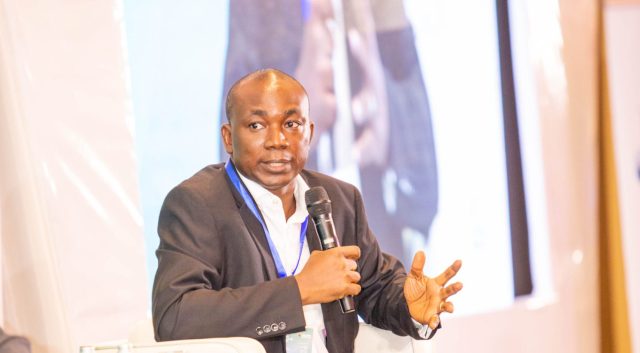A professor at the University of Ghana Business School, Godfred Bokpin is worried that about 80 percent of the contracts awarded by the government is done through sole sourcing.
This, in his view, creates a publem for the public sector financial management.
“Our discussions should be how do we influence expenditure under the Public Financial Management Act? How do we solve the procurement issues? About 80 percent of the large-scale contracts are done through sole souring,” he said while speaking at a national dialogue forum on the theme “Building an economy beyond IMF bailouts, organized by Media General in collaboration with Africa Center for Energy Policy (ACEP) on Tuesday, April 9.
Regarding the support from the International Monetary Fund (IMF), Prof Godfred Bokpin said that from all indications Ghana will go back to the Fund again after the 17th one has ended.
He says the fundamental factors that result in the country going to the Bretton Woods institution for a bailout have not been tackled.
He cited poor management of the public finances and corruption as some of the reasons for the economic challenges that resulted in Ghana to the Fund.
“If a pregnant woman tells me she won’t give birth again I will believe it but if Ghana tells me we won’t go to the IMF again won’t believe it,” he said.
The Executive Director of ACEP Ben Boakye also observed that the award of large-scale contracts by the government presents a huge change to the country when it comes to corruption.
He explained that sole-sourced contracts make it difficult to track efficiency in government spending and also value for money.
Those who usually question this practice, he said, have been targeted for becoming obstacles in the way of politicians.
Ben Boakye urged the critics not to give up on questioning such practices.
“Large-scale investments always go through sole sourcing, making it difficult to track the efficiency of our spending.
“Those who question the practice become the obstacles in the way of the political class. Let’s keep pushing the issues ignore the personalities involved and hold leadership accountable,” he said while speaking at a national dialogue forum on the theme “Building an economy beyond IMF bailouts” organized by Media General in collboration with ACEP.
Mr Ben Boakye further asked civil society organisations (CSOs) and Ghanaians, in general, to be vigilant and ensure that the ongoing programme with the IMF works for the people.
To him, playing an effective watchdog role by CSOs will ensure that the programme achieves its objective.
He said these while speaking at a national dialogue forum on the theme “Building an economy beyond IMF bailouts, organized by Media General Incolboration with ACEP.
“We must be vigilant and play the watchdog well,” he stressed.
“We are reaching out to everybody for us to have a conversation from the defects that keep us going back to the IMF and to ensure we can build on the economy that thrives on our efrost,” he said.
Regarding the IMF deal, the Minister of Finance Dr Mohammed Amin Adam earlier assured that the Ministry, the Bank of Ghana (BoG) and the IMF team had a fruitful opening meeting on Tuesday, April 2 to commence the 2nd Review mission.
The mission staff from the IMF arrived in the country to commence the assessment of Ghana’s performance against the program’s objectives. This evaluation will span the next two weeks.
“The Ministry of Finance, the BoG and the IMF team had a fruitful opening meeting to commence the 2nd Review Mission,” the Ministry wrote on its X platform on Tuesday.
Dr Mohammed Amin Adam earlier said said that a Preliminary assessment undertaken by the Ministry and the central bank showed that they were on course to meet most of the targets under the Programme with the Fund.
In his first monthly press briefing on the economy in 2024, held last week, Dr Amin Adam said “The Ministry of Finance is working with the BoG in preparation for the IMF 2nd Review Mission. Preliminary assessment undertaken by MoF and BoG shows that we are on course to meet most of the targets under the Programme.”
“During the 2nd Review, the IMF mission will engage the authorities in technical and policy discussions to enable them to assess Ghana’s performance on programme objectives, the 6 Quantitative Performance Criteria (QPCs), the 3 Indicative Targets (ITs), 1 Monetary Policy Consultation Clause (MPCC), and the Structural Benchmarks (SBs) with respect to end Dec 2023 targets. They will also review performance towards upcoming QPCs, ITs, and SBs,” he added.
The finance minister emphasised that the approval of the 2nd Review by the IMF Executive Board, potentially in June 2024, will trigger the release of the 3rd tranche of US$360 million, increasing the total disbursements under the programme to US$1.56 billion.
“The 2nd Review will be the first of the two semi-annual reviews programmed for 2024. The 3rd Review has been programmed for Nov 2024,” he added.
The Governor of the Bank of Ghana, Dr Ernest Addison also expressed confidence that Ghana will get a second positive review of the deal with the IMF which will result in the release of the third tranche.
He revealed that the team from the Fund will be arriving in Ghana in April for the second review of the $ 3 billion deal.
The country had already received two tranches, $600million each. The release of the third tranche would increase the total disbursements so far to US$1.56 billion.
Asked when Ghanaians should expect the third tranche while speaking at the 117th Monetary Policy Committee (IMF) press conference in Accra on Monday, March 25, Dr Addison said “On the third tranche of the IMF facility, we are expecting the Fund to come for a second review in April. I think they are going to be here for two weeks, during which they will broadly look at everything, fiscal performance, monetary policy performance, inflation, reserved accumulation as well as some of the structural benchmarks. This would be based on data at the end of December [Last year.]
“From our assessment, we are fairly confident of the performance at the end of December and are not expecting any surprises. If the review is successful, hopefully, the board of the IMF will meet by May or June and we should expect disbursements soon thereafter. This time we are not expecting $600 million, this time we $360 million.”









![“It’s hard to say goodbye” – Christian Atsu’s wife composes emotional tribute song for him [Video]](https://ghananewss.com/storage/2023/05/Christian-atsu-and-wife-100x75.jpeg)








